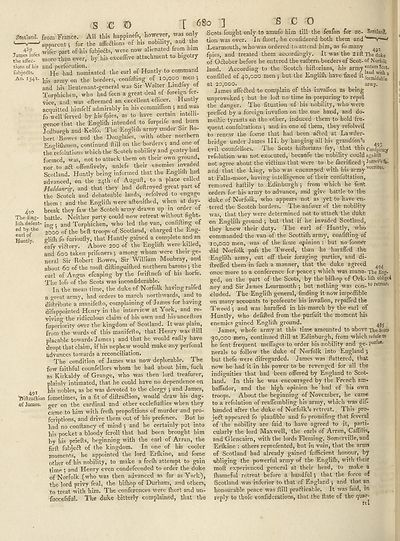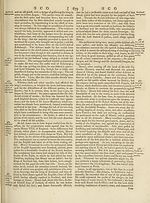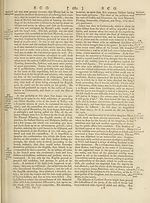Encyclopaedia Britannica, or, a Dictionary of arts, sciences, and miscellaneous literature : enlarged and improved. Illustrated with nearly six hundred engravings > Volume 18, RHI-SCR
(718) Page 680
Download files
Complete book:
Individual page:
Thumbnail gallery: Grid view | List view

4S9 .
.Tames lofes
the affec¬
tions of his
fnbjedts.
An. 1542.
49®
The Eag-
iifli defeat¬
ed by the
earl of
Huntly.
SCO [ 680 ]
SwiUnd. from France. All this happinefs, however, was only
apparent ; for the aifedtions of his nobility, and the
ivifer part of his fubjeas, were now alienated from him
more than ever, by his exceflive attachment to igotry
and perfecution. ,
He had nominated the earl of Huntly to command
his army on the borders, confifting of 10,000 men j
and bis lieutenant-general was Sir Walter Lind fay of
Torphichen, who had feen a great deal of foreign ier-
vice, and was efteemed an excellent officer. Huntly
acquitted himfelf admirably in his commiffion; and was
fo well ferved by his fpies, as to have certain intelli¬
gence that the Engliffi intended to furprife and^ burn
Jedburgh and Kelfo. The Engliffi army under Sir Ro¬
bert Bowes and the Douglaies, with other northein
Engliffimen, continued ftill on the borders ; and one ot
the refelutions which the Scotch nobility and gentry had
formed, was, not to attack them on their own ground,
nor to aft offenfively, unlefs their enemies invaded
Scotland. Huntly being informed that the Engliffi had
advanced, on the 24th of Auguft, to a place called
Hcildanrtg, and that they had deftroyed great part of
the Scotch and debateable lands, refolved to engage
them : and the Engliffi were aftoniffied, when at day¬
break they faw the Scotch army drawn up in order of
battle. Neither party could now retreat without fight-
ffio- and Torphichen, who led the van, confifting of
2000 of the belt troops of Scotland, charged the Eng-
o-liffi fo furioufly, that Huntly gained a complete and an
eafy vi&ory. Above 200 of the Engliffi were killed,
and 600 taken prifoners j among whom were their ge¬
neral Sir Robert Bowes, Sir William Moubray, and
about 60 of the moft diftinguiffied northern barons •, the
earl of Angus efcaping by the fwiftnefs of his horfe.
The lofs of the Scots was inconfiderable.
In the mean time, the duke of Norfolk having raifed
a great army, had orders to march northwards, and to
diftribute a manifefto, complaining of James for having
difappointed Henry in the interview at York, and re¬
viving the ridiculous claim of his own and his anceftors
fuperiority over the kingdom of Scotland. It was plain,
from the words of this manifefto, that Henry was ftill
placable towards James j and that he would eafily have
dropt that claim, if his nephew would make any perfonal
advances towards a reconciliation.
The condition of James was now deplorable. The
few faithful counfellors whom he had about him, fuch
as Kirkaldy of Grange, who was then lord treafurer,
plainly intimated, that he could have no dependence on
his nobles, as he was devoted to the clergy ; and James,
fometimes, in a fit of diftraftion, would draw his dag¬
ger on the cardinal and other ecclefiafties when they
came to him with frefti propofitions of murder and pro-
feriptions, and drive them out of his prefence. But he
had no conftancy of mind *, and he certainly put into
his pocket a bloody fcroll that had been brought him
by his priefts, beginning with the earl of Arran, the
firft fubjett of the kingdom. In one of his cooler
moments, he appointed the lord Erfldne, and fome
other of his nobility, to make a freffi attempt to gain
time. ; and Henry even condefcended to order the duke
of Norfolk (who was then advanced as far as York),
the lord privy feal, the biffiop of Durham, and others,
to treat with him. The conferences were fhort and un-
fuccefsful. The duke bitterly complained, that the
SCO
493
> Confpiracy
49L
T5i ft raft ion
of James.
Scots fought only to amufe him till the feafon for at- Scotland,
tion was over. In ftiort, he confidered both them and *
Learmouth, who was ordered to attend him, as fo many
fpies, and treated them accordingly. It was the 21ft The duke
of October before he entered the eartern borders of Scot-of Norfolk
land. According to the Scotch hiftorians, his army^rsSc°t-
confifted of 40,000 men j but the Englifh have fixed it fo“mi2lea
at 20,000. army.
James affedted to complain of this invafion as being
unprovoked 5 but he loft no time in preparing to repel
the danger. The fituation of his nobility, who were
preffed by a foreign invafion on the one hand, and do-
meftic tyrants on the other, induced them to hold fre¬
quent conful tat ions ; and in one of them, they refolved
to renew the feene that had been adled at Lawder-
bridge under James III. by hanging all his grandidn’s
evil counfellors. The Scots hiftorians fay, that this^,. ,
refolution was not executed, becanfe the nobility could againft
not agree about the victims that were to be facrificed ; James’s fa-
and that the king, who was encamped with his armyvoun *5‘
at Falla-moor, having intelligence of their eonfultation,
removed haftily to Edinburgh 5 from which he fent
orders for his army to advance, and give battle to the
duke of Norfolk, who appears not as yet to have en¬
tered the Scotch borders. The anfwer of the nobility
was, that they were determined not to attack the duke
on Englifti ground •, but that if he invaded Scotland,
they knew their duty. The earl of Huntly, who
commanded the van of the Scottifh army, confifting of
J0,000 men, was of the fame opinion : but no foonet
did Norfolk pafs the Tweed, than he harafTed the
Engliffi army, cut off their foraging parties, and di-
ftreffed them in fuch a manner, that the duke agreed ^
once more to a conference for peace 5 which was mana-TheEng-
ged, on the part of the Scots, by the biffiop of Ork- liih obliged
riey and Sir James Learmouth •, but nothing was con_ to retreat,
eluded. The Engliffi general, finding it now impoffible
on many accounts to profecute his invafion, repaffed the
Tweed ; and was haraffed in his march by the earl of
Huntly, who defifted from the purfuit the moment his
enemies gained Engliffi ground.
James, whofe army at this time amounted to above The Scots
30,000 men, continued ftill at Edinburgh, from which refute to
he fent frequent meffages to order his mobility and ge-Pur-ue-
nerals to follow the duke of Norfolk into England j
but thefe were difregarded. James was flattered, that
now be had it in his power to be revenged for all the
indignities that had been offered by England to Scot¬
land. In this he was encouraged by the French am-
baffador, and the high opinion he had of his own
troops. About the beginning of November, he came
to a refolution of reaffembling his army, which Was di£
banded after the duke of Norfolk’s retreat. This pro-
je<ft appeared fo plaufible and fo promifing that feveral
of the nobility are faid to have agreed to it, parti¬
cularly the lord Maxwell, the earls of Arran, Caffilis,
and Glencairn, with the lords Fleming, Somerville,and
Edkine : others reprefented, but in vain, that the arms
of Scotland had already gained fufficicnt honour, by
obliging the powerful army of the Engliffi, with their
moft experienced general at their head, to make a
ffiameful retreat before a handful; that the force of
Scotland was inferior to that of England j and that an
honourable peace was ftill prafticable. It was faid, in
reply to thofe confidorations, that the ftate of the quar¬
rel
.Tames lofes
the affec¬
tions of his
fnbjedts.
An. 1542.
49®
The Eag-
iifli defeat¬
ed by the
earl of
Huntly.
SCO [ 680 ]
SwiUnd. from France. All this happinefs, however, was only
apparent ; for the aifedtions of his nobility, and the
ivifer part of his fubjeas, were now alienated from him
more than ever, by his exceflive attachment to igotry
and perfecution. ,
He had nominated the earl of Huntly to command
his army on the borders, confifting of 10,000 men j
and bis lieutenant-general was Sir Walter Lind fay of
Torphichen, who had feen a great deal of foreign ier-
vice, and was efteemed an excellent officer. Huntly
acquitted himfelf admirably in his commiffion; and was
fo well ferved by his fpies, as to have certain intelli¬
gence that the Engliffi intended to furprife and^ burn
Jedburgh and Kelfo. The Engliffi army under Sir Ro¬
bert Bowes and the Douglaies, with other northein
Engliffimen, continued ftill on the borders ; and one ot
the refelutions which the Scotch nobility and gentry had
formed, was, not to attack them on their own ground,
nor to aft offenfively, unlefs their enemies invaded
Scotland. Huntly being informed that the Engliffi had
advanced, on the 24th of Auguft, to a place called
Hcildanrtg, and that they had deftroyed great part of
the Scotch and debateable lands, refolved to engage
them : and the Engliffi were aftoniffied, when at day¬
break they faw the Scotch army drawn up in order of
battle. Neither party could now retreat without fight-
ffio- and Torphichen, who led the van, confifting of
2000 of the belt troops of Scotland, charged the Eng-
o-liffi fo furioufly, that Huntly gained a complete and an
eafy vi&ory. Above 200 of the Engliffi were killed,
and 600 taken prifoners j among whom were their ge¬
neral Sir Robert Bowes, Sir William Moubray, and
about 60 of the moft diftinguiffied northern barons •, the
earl of Angus efcaping by the fwiftnefs of his horfe.
The lofs of the Scots was inconfiderable.
In the mean time, the duke of Norfolk having raifed
a great army, had orders to march northwards, and to
diftribute a manifefto, complaining of James for having
difappointed Henry in the interview at York, and re¬
viving the ridiculous claim of his own and his anceftors
fuperiority over the kingdom of Scotland. It was plain,
from the words of this manifefto, that Henry was ftill
placable towards James j and that he would eafily have
dropt that claim, if his nephew would make any perfonal
advances towards a reconciliation.
The condition of James was now deplorable. The
few faithful counfellors whom he had about him, fuch
as Kirkaldy of Grange, who was then lord treafurer,
plainly intimated, that he could have no dependence on
his nobles, as he was devoted to the clergy ; and James,
fometimes, in a fit of diftraftion, would draw his dag¬
ger on the cardinal and other ecclefiafties when they
came to him with frefti propofitions of murder and pro-
feriptions, and drive them out of his prefence. But he
had no conftancy of mind *, and he certainly put into
his pocket a bloody fcroll that had been brought him
by his priefts, beginning with the earl of Arran, the
firft fubjett of the kingdom. In one of his cooler
moments, he appointed the lord Erfldne, and fome
other of his nobility, to make a freffi attempt to gain
time. ; and Henry even condefcended to order the duke
of Norfolk (who was then advanced as far as York),
the lord privy feal, the biffiop of Durham, and others,
to treat with him. The conferences were fhort and un-
fuccefsful. The duke bitterly complained, that the
SCO
493
> Confpiracy
49L
T5i ft raft ion
of James.
Scots fought only to amufe him till the feafon for at- Scotland,
tion was over. In ftiort, he confidered both them and *
Learmouth, who was ordered to attend him, as fo many
fpies, and treated them accordingly. It was the 21ft The duke
of October before he entered the eartern borders of Scot-of Norfolk
land. According to the Scotch hiftorians, his army^rsSc°t-
confifted of 40,000 men j but the Englifh have fixed it fo“mi2lea
at 20,000. army.
James affedted to complain of this invafion as being
unprovoked 5 but he loft no time in preparing to repel
the danger. The fituation of his nobility, who were
preffed by a foreign invafion on the one hand, and do-
meftic tyrants on the other, induced them to hold fre¬
quent conful tat ions ; and in one of them, they refolved
to renew the feene that had been adled at Lawder-
bridge under James III. by hanging all his grandidn’s
evil counfellors. The Scots hiftorians fay, that this^,. ,
refolution was not executed, becanfe the nobility could againft
not agree about the victims that were to be facrificed ; James’s fa-
and that the king, who was encamped with his armyvoun *5‘
at Falla-moor, having intelligence of their eonfultation,
removed haftily to Edinburgh 5 from which he fent
orders for his army to advance, and give battle to the
duke of Norfolk, who appears not as yet to have en¬
tered the Scotch borders. The anfwer of the nobility
was, that they were determined not to attack the duke
on Englifti ground •, but that if he invaded Scotland,
they knew their duty. The earl of Huntly, who
commanded the van of the Scottifh army, confifting of
J0,000 men, was of the fame opinion : but no foonet
did Norfolk pafs the Tweed, than he harafTed the
Engliffi army, cut off their foraging parties, and di-
ftreffed them in fuch a manner, that the duke agreed ^
once more to a conference for peace 5 which was mana-TheEng-
ged, on the part of the Scots, by the biffiop of Ork- liih obliged
riey and Sir James Learmouth •, but nothing was con_ to retreat,
eluded. The Engliffi general, finding it now impoffible
on many accounts to profecute his invafion, repaffed the
Tweed ; and was haraffed in his march by the earl of
Huntly, who defifted from the purfuit the moment his
enemies gained Engliffi ground.
James, whofe army at this time amounted to above The Scots
30,000 men, continued ftill at Edinburgh, from which refute to
he fent frequent meffages to order his mobility and ge-Pur-ue-
nerals to follow the duke of Norfolk into England j
but thefe were difregarded. James was flattered, that
now be had it in his power to be revenged for all the
indignities that had been offered by England to Scot¬
land. In this he was encouraged by the French am-
baffador, and the high opinion he had of his own
troops. About the beginning of November, he came
to a refolution of reaffembling his army, which Was di£
banded after the duke of Norfolk’s retreat. This pro-
je<ft appeared fo plaufible and fo promifing that feveral
of the nobility are faid to have agreed to it, parti¬
cularly the lord Maxwell, the earls of Arran, Caffilis,
and Glencairn, with the lords Fleming, Somerville,and
Edkine : others reprefented, but in vain, that the arms
of Scotland had already gained fufficicnt honour, by
obliging the powerful army of the Engliffi, with their
moft experienced general at their head, to make a
ffiameful retreat before a handful; that the force of
Scotland was inferior to that of England j and that an
honourable peace was ftill prafticable. It was faid, in
reply to thofe confidorations, that the ftate of the quar¬
rel
Set display mode to:
![]() Universal Viewer |
Universal Viewer | ![]() Mirador |
Large image | Transcription
Mirador |
Large image | Transcription
Images and transcriptions on this page, including medium image downloads, may be used under the Creative Commons Attribution 4.0 International Licence unless otherwise stated. ![]()
| Permanent URL | https://digital.nls.uk/193028041 |
|---|
| Attribution and copyright: |
|
|---|
| Description | Ten editions of 'Encyclopaedia Britannica', issued from 1768-1903, in 231 volumes. Originally issued in 100 weekly parts (3 volumes) between 1768 and 1771 by publishers: Colin Macfarquhar and Andrew Bell (Edinburgh); editor: William Smellie: engraver: Andrew Bell. Expanded editions in the 19th century featured more volumes and contributions from leading experts in their fields. Managed and published in Edinburgh up to the 9th edition (25 volumes, from 1875-1889); the 10th edition (1902-1903) re-issued the 9th edition, with 11 supplementary volumes. |
|---|---|
| Additional NLS resources: |
|

